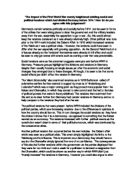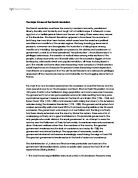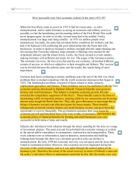The Weakness of the Directory was the main reasons for Napoleons rise to Power. How far do you agree?
The Weakness of the Directory was the main reasons for Napoleon's rise to Power. How far do you agree? On 10th November 1799 the Coup of Brumaire brought about a leader who would bring France's power to the forefront of Europe, a nation feared by all others. The coup was the final of a series of coups between 1797 and 1799. This shows that the Directory was extremely weak which caused Napoleon to rise to power, however there were other reasons as well, such as Napoleon's political connections, his success in wars and his own personal strengths, and the opportunities he creates for himself. The revolution in France was by no means a quick process, taking over ten years before stability was finally regained and Napoleon came to power. During the ten years there were many different types of government all with different ideas, however not one of the governments really affected the peasants, thus the people of France became fed up. Fed up of paying taxes to sort out the massive financial chaos, fed up of paying for pointless wars and so people just didn't care enough to stop Napoleon rising to power, despite warnings about him from Benjamin Constant, who believed he was to self-centred, which through policies in the Napoleonic Code actually turn out to be true. The revolution also created a whole in the army due to many of the military generals who were loyal to the king,
Using these four passages and your own knowledge, assess the view that Napoleons Empire in Europe after 1804 offered little benefit to its subjects.
Adam Appleby Centre No. 39339 Candidate No. 7004 Using these four passages and your own knowledge, assess the view that Napoleon’s Empire in Europe after 1804 offered little benefit to its subjects. Views regarding if Napoleon offered virtuous benefits to the subjects of his Empire are fraught with different view points. Interpretations B and C both agree with the viewpoint that Napoleon offered very little benefit to his subjects, “The ideals of legal equality… social designs”, interpretation. Conversely, interpretations A and D support the opposite idea that being part of the Napoleonic Empire was actually very beneficial to the subjects, “liberated from seigniorial rights”; “Even the downsides such as… for a centralized state”. Taking all interpretations into consideration and actual knowledge of the Napoleonic Empire, it is easy to see that while Napoleon ruled with an iron fist, he did indeed offer several benefits to subjects of his Empire directly or indirectly which both can be seen in Poland by the use of Napoleon in their national hymn of living up to ‘us and Napoleon’ interpretation D. Both interpretations, A and D, show clear disagreement with the view that Napoleon was of little benefit to European subjects after 1804. Firstly interpretation A shows this with “Napoleon saw the Civil Code… the Civil Code everywhere.” This contradicts
Assess the successes and failures of Mussolini's domestic policy.
Assess the successes and failures of Mussolini's domestic policy. Mussolini's primary aim in 1919 when he came into power was to fascitise the Italian nation as a whole, young and old; he wanted his nation to be utterly committed and disciplined towards the new fascist state rather than being passive and going along with everyone else. To achieve this goal, Mussolini set about trying to influence and ultimately change make domestic establishments more 'fascist', that is, to follow the principles of a very right-wing, nationalist totalitarian state in which the 'Duce is always right' and in which the principles of 'Believe, Obey, Fight' are considered paramount. Mussolini attempted to alter Church-state relations, to create the perfect fascist woman, to fascitise the educational system and the youths of Italy, to change Italy's economic and political structure, and to create a nation that would be respected by other nations, by using his strategies of the 'battle for land, grain and births' and by proving the strength of the nation through sporting achievements. However, Mussolini's policies failed to unite the country and fascitise the nation as a whole; his economic polices were disastrous, Italy was fairly weak politically, and women and teenagers failed to be heavily affected by a fascist state; Mussolini did handle the Church-State relations well however but in the
To what extent does Stalin deserve the title of Red Tsar when assessing his rule in the context of Russian government from 1855- 1964?
To what extent does Stalin deserve the title of 'Red Tsar' when assessing his rule in the context of Russian government from 1855- 1964? When Stalin rose to power in 1929 he claimed to the Russian public that he was a devote follower of Leninism; his slogan 'Lenin is always with us'1 meant that Stalin wanted to show how similar he was to Lenin. However Stalin asserted his power at the head of government much like the Tsars by employing tactics of fear and propaganda. Stalin's personal dictatorship meant he had strong elements of being 'Red Tsar' as he established unquestionable rule, this idea of being a 'Red Tsar' came from the belief that Stalin wasn't committed to communism, as his traditional ideas were reminiscent of Tsarist autocratic rule, so effectively he was a fusion between the two ruling styles. As Stalin wished to portray himself as a 'God-like' figure; this made him an isolated leader who tolerated no criticism, similar to the style of ruling under the Tsars, as both leaders dismissed ministers at their own will and chose to act on their own personal feelings, for example like the Russification policy of employed by all the Tsars, but in particular Alexander II and the nationalistic policies of Stalin. Stalin's government was 'top-down'2, and unlike Lenin and Khrushchev, Stalin was very wary of how much his fellow party members knew. Therefore he employed a
Why did the League of Nations fail?
Why did the League of Nations fail? By Richard Ward [email protected] The objectives of the League of Nations were to 'promote international co-operation and to achieve peace and security'. The League failed these ideals as early as 1921, when Poland occupied Vilna. It failed these objectives once more in 1923 when Mussolini held Greece ransom by occupying and bombing the island of Corfu. Yet the League was not dissolved until 1946. It continued to meet and its agencies continued their work. It was only after 1936 and the collapse of Abyssinian resistance that public opinion swung against the League on a great scale. Until the early 1930s, the League of Nations had been displayed in a favourable light as a success. The failures at Corfu and Vilna had been overshadowed by successes at the Åland Islands and in the Greek-Bulgarian war and the booming world economy. Added to that, improvements in international relations had cast a general aura of wellbeing over the world. In hindsight, it is arguable that the League had failed shortly after it had started, but at that time everyone was shocked at the realisation that the League was not everything it said it was. On October 24th 1929, the US stock market in Wall Street crashed. The value of shares plummeted as the stock market was ordered to 'sell at any price'. Herbert Hoover, US President, had advocated the

















